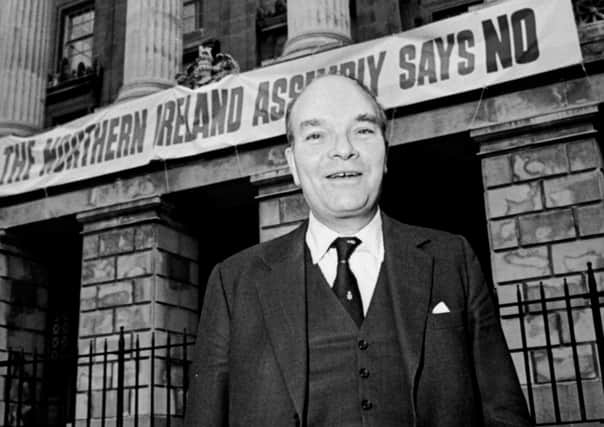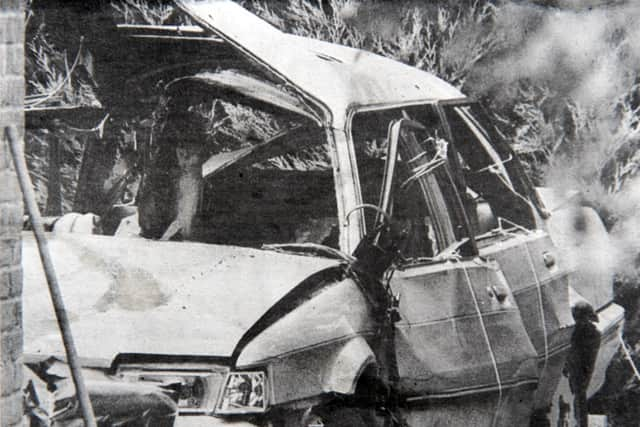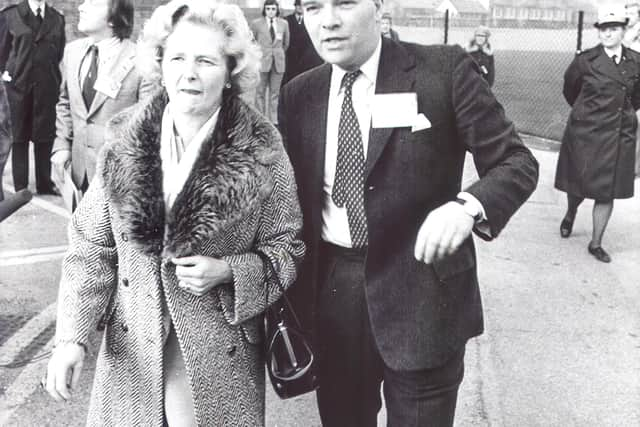IRA car-bomb murder 30 years on: ‘If we had more Ian Gows, the world would be a better place’


Ian Gow, a Tory minister and close ally of Margaret Thatcher, was killed by an under-car bomb outside his home in the small Sussex village of Hankham, on July 30, 1990.
He was the last MP to be murdered, until a right-wing extremist killed Labour MP Jo Cox in 2016.
Advertisement
Hide AdAdvertisement
Hide AdBut many victims of republican paramilitaries predeceased him (see sidebar).


Norman Tebbit, a Lord and former chairman of the Conservative Party, told the News Letter: “He was not only a very bright, intelligent man, he was a very humorous man, a very sociable man. Indeed, if we had more Ian Gows it would be a rather better world.”
Lord Tebbit survived the IRA’s 1984 Brighton Bombing, which had been intended to essentially wipe out the whole UK cabinet. His wife was left permanently disabled.
Lord Tebbit said whilst it was a shock to hear of Mr Gow’s death, “none of us were surprised at the capability of the IRA for such things”.
Advertisement
Hide AdAdvertisement
Hide AdHe said “whilst you have politicians like Jeremy Corbyn who was sympathetic to the IRA” it is no surprise that Sinn Fein enjoy popularity in Ireland.


He added: “Seeking to advance a political programme by murdering one’s opponents can never result in anything but bitterness and strife.
“He [Ian] was a unionist. And he paid for it – paid for being a unionist and a supporter of Thatcher with his life.”
He said of his Conservative colleagues: “I shall raise a glass to the memory of Ian Gow on Thursday, and I hope they will all join me in doing so.”
Advertisement
Hide AdAdvertisement
Hide AdThe Troubles tome ‘Lost Lives’ says he was 53, and married with two children.
He was a soldier-turned-solicitor, who briefly held posts as housing and treasury minister – and was Mrs Thatcher’s parliamentary private secretary during her first term as PM.
Despite his loyalty to Mrs Thatcher, he quit in protest at the Anglo-Irish Agreement, creating a ‘Friends of the Union’ party group to oppose it.
Trevor Ringland, a former co-chairman of the Northern Irish wing of the Conservative Party (but now no longer a member) said: “It’s a continuing reminder of why we have to keep working to make sure what happened never happens again.
Advertisement
Hide AdAdvertisement
Hide Ad“But it’s been a very difficult journey, not least because those who carried out that murder show no regret or recognition of the wrong they did, and continue to fail to recognise that their campaign of violence was unnecessary and unjustified.
“They murdered an Englishman. When the real problem is with their fellow Irish, who also happen to be British. Yet they keep dragging the English into it with their very warped view of the present, and the last couple of hundred years.”
The book ‘Lost Lives’ quotes a passage from the Independent newspaper concerning his murder.
The passage said: “In a sense, Mr Gow may have been attacked as a surrogate for Margaret Thatcher, who will always be the terrorists’ main target. The IRA has been unable, since the 1984 Brighton hotel bombing, of penetrating the security surrounding her.
Advertisement
Hide AdAdvertisement
Hide Ad“His death may amount to an IRA acknowledgement that she is beyond their reach.”
The IRA declared that bombings would continue until the UK “ends partition (of Ireland) and recognizes the Irish people’s right to self-determination and democracy”.
After his killing, Ian Paisley told the Commons that 1990 would be remembered as the year the IRA launched their “human bomb” campaign in Northern Ireland, but also added: “This year the IRA has been more active in Great Britain and on the continent than ever before.
“The late Ian Gow, who represented Eastbourne, fell massacred by IRA terrorists, leaving his seat vacant, and we must also consider that.”
Advertisement
Hide AdAdvertisement
Hide AdThe News Letter tried to reach the Gow family via the Tory Party HQ, but could not.
No-one has been convicted of his murder.
OTHER SERVING MPs MURDERED BY PARAMILITARIES:
• March 30 1979:
Airey Neave, Conservative shadow secretary of state for Northern Ireland, blown up by the INLA in Westminster.
• November 14, 1981:
Robert Bradford, Methodist cleric and member of the Ulster Unionists, shot dead (along with an innocent bystander) in Finaghy, south Belfast, by PIRA.
• October 12, 1984:
Sir Anthony Berry, Conservative, killed in the PIRA Brighton bomb, which exploded just before 3am as hotel guests slept. Also killed was a local Tory party chairman and the wives of three Conservative Party members.
A message from the Editor:
Advertisement
Hide AdAdvertisement
Hide AdThank you for reading this story on our website. While I have your attention, I also have an important request to make of you.
With the coronavirus lockdown having a major impact on many of our advertisers - and consequently the revenue we receive - we are more reliant than ever on you taking out a digital subscription.
Subscribe to newsletter.co.uk and enjoy unlimited access to the best Northern Ireland and UK news and information online and on our app. With a digital subscription, you can read more than 5 articles, see fewer ads, enjoy faster load times, and get access to exclusive newsletters and content. Visit https://www.newsletter.co.uk/subscriptions now to sign up.
Our journalism costs money and we rely on advertising, print and digital revenues to help to support them. By supporting us, we are able to support you in providing trusted, fact-checked content for this website.
Alistair Bushe